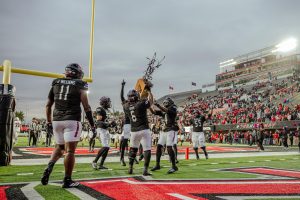UC voices document concerns
November 5, 1987
When discussing NIU’s proposed constitution Tuesday, the University Council expressed concerns about some of the changes and offered additional recommendations to the constitutional task force.
The Presidential Task Force on Constitutional Revision will be meeting a final time to review suggestions made by the council members before the UC votes on the document Dec. 16, UC Executive Secretary Judith Bischoff said.
The council did make some changes to the document by concensus. However, many of the recommendations prompted much discussion and the council members determined by a 17-16 vote that the task force should meet again to review the concerns.
Geology Professor Malcolm Weiss presented a proposal to the UC and the task force regarding article six of the constitution dealing with faculties, standing committees and councils, and boards of the faculty and the administration. Weiss’s proposal asks for a provision to be added to the article for standing committees to elect faculty chairmen.
owever, some concerns were expressed by council members in regard to this provision.
“I am not at all sure the Board of Regents would accept the constitution with this provision,” council member William Monat said. Council members expressed concern that the Regents and the Illinois Board of Education would be reluctant to adopt this provision for standing committees such as the Academic Planning Committee and the University Resources Advisory Committee because these are chaired by the provost and the university president. “The board expects the provost, in effect, to be the person reporting on academic planning,” NIU President John LaTourette said.
Monat said the university would be at a disadvantage in dealing with the two boards, the legislature and other outside agencies without strong administrative representation.
James Banovetz, who drafted the constitution, suggested the council consider the designation of vice chairman to the standing committees, who would be a faculty member. “This has worked well previously and we were able to exercise a significant faculty voice,” Banovetz said.
Concerns also were expressed by council members in regard to Article 9 dealing with human rights, which was just added to the constitution within the past two weeks. The council members discussed groups which might be exceptions to a clause calling for equality of treatment for all members of the university community.
In general, the provision states all university members are entitled to fair, impartial and equal treatment regardless of factors unrelated to their scholarly or professional performance, such as sex, race or handicapped status.
Banovetz cited the military science department as an example because they might be in violation of this clause due to federal policy. Jon Dalton, vice president for student affairs, said some financial aid programs also might be in violation of the provision. Athletes were cited as a third example.
“There are a number of areas where equal treatment could be misconstrued,” Dalton said.
James Norris, liberal arts and sciences dean, said the task force believed everyone would agree on the clause which would allow equal treatment for all members of the university.
Council member Jeffrey Parness expressed concern for another provision in Article 9 dealing with due process. “What does this provision do? We might be saying this is a right under law and there is no other right,” Parness said.
LaTourette said NIU’s legal counsel raised the point that due process should be guaranteed in the constitution but guidelines should be spelled out in the bylaws.
The inclusion of a due process provision in the constitution was suggested in the open hearings by biology Professor Jack Bennett. Bennett felt due process was too important to be left to the bylaws.
LaTourette suggested Parness, NIU College of Law associate professor, assist the task force in consultation with legal counsel to discuss the due process provision.
Finally, the council discussed Article 10 dealing with amendment procedures. The proposed constitution changes the vote required to amend the constitution from three-fourths to two-thirds vote. “We made this move so that neither group (faculty or students) could impact constitutional change. We set this figure so faculty could not force change and so students could not block change,” Banovetz said.
owever, some council members did not think this change was needed. “Based on the idea of a constitution and Robert’s Change of Order, the change to two-thirds is inappropriate,” said one council member.
Task Force Chairman Jim Giles said, “From input from the faculty, this is the most important change in the constitution. It is what they want. If this change does not come up there will be increased pressure for a faculty senate or collective bargaining.”
Council members cited an example of when students blocked a constitutional change last year which would have removed the eight dean votes on the council to increase faculty representation.
Bischoff said council members who have recommendations should send them, in writing, to the task force by Nov. 13.






